Flooring Installation Costs: Types of Flooring and Price Guide
Last updated 28th May, 2025
If you’ve decided to install new flooring in your home, you might be overwhelmed by the amount of choice and the difference in costs. That’s why we’ve created this guide. We go through the different types of flooring available and the costs to buy and install each type. We also highlight the pros and cons and tell you which flooring options you could install yourself as a DIY project.
There are flooring options for every budget. Costs vary between £8 and £200 per m2, depending on the type of flooring you have installed. For example, if you want to lay carpet in a 16m2 room, you should expect to pay around £128 at the cheaper end of the scale and around £1,680 to lay a wool carpet. Tiles cost more than other types of flooring. To lay tiles in a room of 16m2, you will be looking at a cost of between £240 and £3,200.
In addition to the cost of the flooring, you’ll also need to add installation costs to your budget. Prices depend on the type of flooring and the size, but on average, you will pay between £50 and £900 in labour costs.
Let’s find out more…
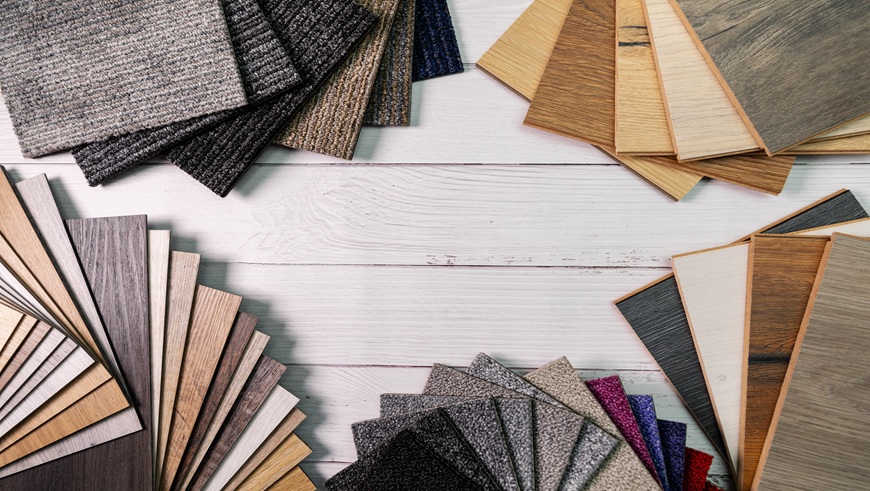
Table of Contents
How Much Does Flooring Installation Cost?
There are a number of things to consider when you want to lay a new floor. The total cost will depend on:
The type of flooring material: How much to lay carpet or laminate flooring?
If you don’t have a big budget, then consider laying carpet or laminate. Although some carpet materials, like wool, are expensive, you can buy a synthetic material for between £8 and £12 per m2. Laminate, on the other hand, costs between £12 and £61 per m2.
If you have a larger budget, you might prefer to install a hardwood floor, which will cost between £50 and £90 per m2.
Room Size and Shape
The room size will impact the cost because the larger the room, the more flooring you’ll need. The shape affects the installation costs. If you have a standard shape, then laying the floor will be easier and cost less. A room with an awkward shape will make installation more complex. It will take longer and cost more.
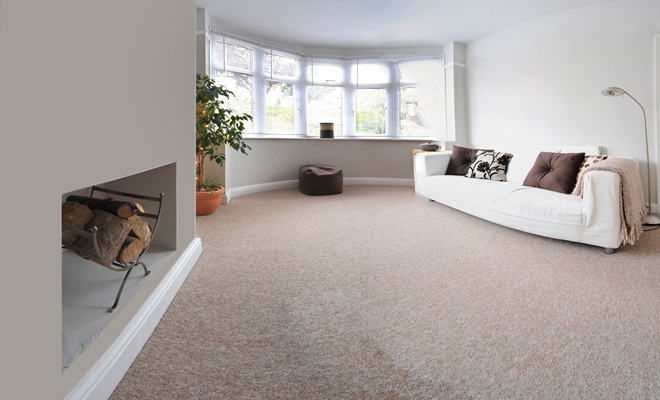
Installation Complexity
Carpet and vinyl are relatively easy to install as they are rolled out into the room. Engineered wood may take longer, but with a click-lock system, the installation isn’t complicated. However, tiled and solid hardwood floors need to be installed by a specialist with the right skills and expertise.
Underlay Requirements
Some flooring types need insulation and cushioning, which is achieved by using underlay. This is an extra cost for both the material and labour.
Subfloor Condition
If your original floor is in bad repair, then it may need to be levelled or protected against moisture ingress before your new floor can be laid.
Waste Disposal
You may have to pay out to have your old floor taken up and disposed of, which will be an extra cost.
Labour Costs
The labour costs will depend on the professional you use. For example, a carpet fitter will generally charge between £20 and £30 an hour. A carpenter will charge between £30 and £60 an hour to install a wooden floor. If you use a handyperson to lay a vinyl floor, it will cost between £20 and £40 per hour. If you’re having a tiled floor laid by a tiler, then you will pay between £40 and £50 per hour or around £45 per m2.
Costs of Flooring
| Type | Cost per m2 | Installation Cost | Timescale | Underlay Per m2 |
|---|---|---|---|---|
| Laminate | £12 - £61 | £120 - £200 | 1 - 2 days | £1 - £3 |
| Engineered Wood | £45 - £60 | £120 - £600 | 1 - 3 days | £3 - £4 |
| Solid Wood | £50 - £90 | £120 - £600 | 1 - 3 days | £3 - £4 |
| Vinyl | £10 - £30 | £60 - £200 | 4 hours – 1 day | £4 - £6 |
| Tiles | £15 - £50 | £120 - £600 | 2 - 3 days | £7 - £10 |
| Carpet | £6 - £60 | £60 - £200 | 4 hours - 1 day | £2 - £4 |
| Luxury Vinyl | £15 - £60 | £120 - £400 | 1 - 2 days | £6 - £10 |
Installation Costs
| Type | Cost per m2 | 10m2 | 20m2 | 30m2 |
|---|---|---|---|---|
| Laminate | £12 - £61 | £260 - £870 | £380 - £1500 | £510 - £2150 |
| Engineered Wood | £45 - £60 | £600 - £840 | £1080 - £1480 | £1560 - £2120 |
| Solid Wood | £50 - £90 | £650 - £1140 | £1180 - £2080 | £1710 - £3020 |
| Vinyl | £10 - £30 | £200 - £560 | £340 - £880 | £480 - £1280 |
| Tiles | £15 - £50 | £340 - £1200 | £560 - £2300 | £780 - £2400 |
| Carpet | £6 - £60 | £140 - £840 | £220 - £1480 | £300 - £2120 |
| Luxury Vinyl | £15 - £60 | £330 - £1100 | £540 - £1800 | £750 - £2500 |
Additional Costs to Consider
Removing Old Flooring
Some types of flooring are cheap to remove. Carpet, for example, can cost between £1 and £4 per m2 or between £15 and £20 for the whole carpet. Wood, on the other hand, takes longer to remove, so labour charges are higher.
You can expect to pay between £25 and £75 for the removal, and then you may need to hire a skip to dispose of the old flooring, which will cost somewhere between £50 and £150.
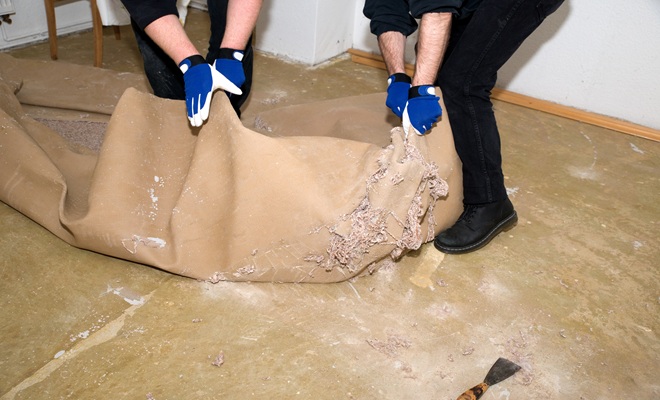
Subfloor Preparation
If your floor is in poor repair, you might need to have it screeded before laying a new floor. This will make sure you have a level, smooth surface for your new flooring. The cost of screeding will depend on the type of screed you use.
For example, traditional sand and cement screed is, on average, between £11 and £14 per m2. Quick drying screed, on the other hand, will cost between £14 and £18 per m2.
If you were to lay traditional screed in an area of 50m2, you would pay between £550 and £700 for materials and around £600 for labour. Quick drying screed laid in an area of 50m2 will cost on average, between £700 and £900 for materials and £600 for labour.
Underlay Costs
Some flooring requires underlay Prices will vary depending on the size of the room and the quality of the underlay. You can expect to pay between £1 and £11 per m2.
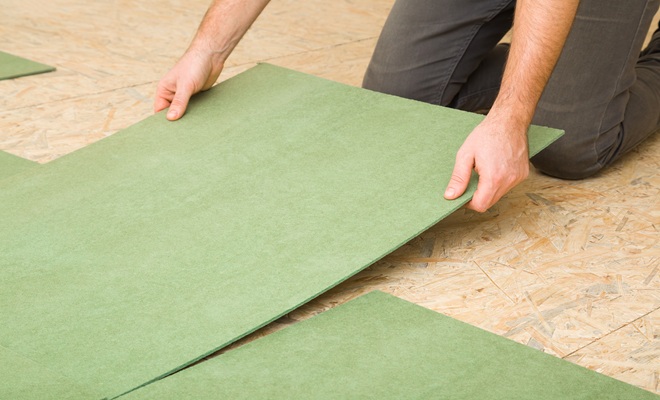
Skirting Board Adjustments
To lay new flooring, it might be necessary to remove your old skirting boards or replace them. The cost to temporarily remove skirting boards and have them refitted. A professional will likely charge by the hour for this job.
You can expect to pay between £20 and £25 per hour. If it’s a big job, then it may take half a day or a day, which will cost between £80 and £200.
Furniture removal and room preparation
You might want to remove furniture and prepare the room yourself, which means you’ll save money. But if you get a handyperson to do the work, then you should expect to pay between £20 and £40 an hour.
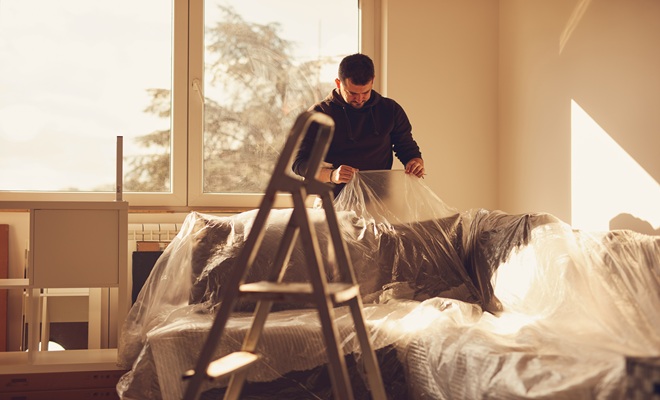
Additional Finishes
You might incur extra costs if you have to have a floor sealed or varnished. Often, hardwood floors need to be treated after installation. The cost of sanding and varnishing a wooden floor costs between £150 and £600, depending on the size of the room. Staining a floor will cost, on average, between £40 and £240.
Additional costs are likely to be cheaper if you are installing new flooring in more than one room. It means you can buy materials in larger quantities, which may be cheaper. A professional flooring installer might give you a lower quote by charging a per-project rate.
Cost Breakdown Calculator
Individual costs for fitting flooring for a 20m2 floor - Total Cost: £1710
Materials
£730
Labour
£940
Underlay
£40
Labour Costs and Time Frames
If you are having a floor laid by a flooring specialist to lay a wooden or tiled floor, then you will pay more than if you used the services of a handyperson, for example, to lay vinyl or a carpet fitter to install new carpet.
Labour costs will depend on the complexity of the job, the type of flooring being laid, the size of the room and the number of hours it will take to get the job done. Have a look at the chart below to find out the average costs of laying a floor depending on the material used:
| Type | Time to | Labour £15ph | Labour £25ph |
|---|---|---|---|
| Carpet | 1 day | £120 | £200 |
| Vinyl | 4 – 8 hours | £60 - £120 | £100 - £200 |
| Laminate | 6 - 8 hours | £90 - £120 | £150 - £200 |
| Wood | 1 - 3 days | £120 - £360 | £200 - £600 |
| Tiles | 1 - 3 days | £120 - £360 | £200 - £600 |
| Luxury Vinyl | 1 - 2 days | £120 - £240 | £200 - £400 |
Types of Flooring and Costs
The cost of laying new flooring will depend on the size of the room and the type of flooring you choose. Here are some common flooring choices, together with their costs and the pros and cons of each type:
Laminate Flooring Installation Cost
Laminate flooring installation is popular with householders who prefer a cost-effective option with plenty of design and style choices.
The benefit of laying laminate flooring is that it can imitate most other flooring types without the expense. For example, if you want laminate floor installation that imitates timber or tile, but you’re on a budget, then laminate with a wood look or timber will cost you a lot less.
Laminate Flooring Cost:
You can buy wood-style laminate for between £12 and £61 per m2. Faux tiling will cost between £14 and £15 per m2. Solid wood flooring, on the other hand, will cost between £35 and £55 per m2, and porcelain tiles will cost between £18 and £50 per m2.
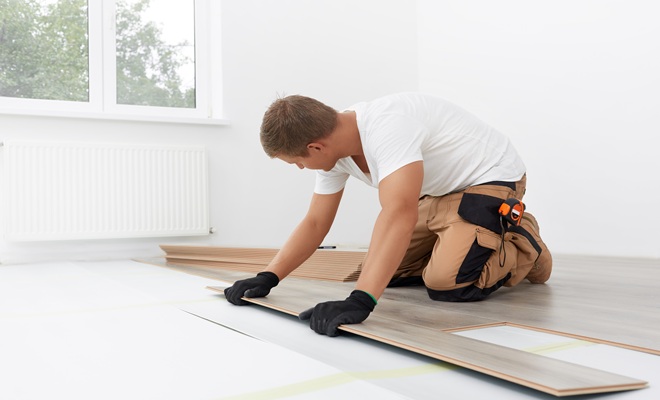
Pros
- ✔ Plenty of design choices
- ✔ Easy installation
- ✔ Good choice if you have underfloor heating
Cons:
- ✖ Can’t be patched or repaired
- ✖ Cold underfoot
- ✖ Water resistant but not waterproof
Engineered Wood Flooring Installation Cost
Engineered wood is cheaper than a hardwood floor, but it looks very similar. Engineered wood is made from several layers of wood with a solid wood veneer at the top. These layers make it hardwearing and less prone to warping. You can choose various styles and finishes, which have a bearing on the price.
Engineered Wood Flooring Cost
The cost of engineered wood is, on average, between £45 and £60 per m2.
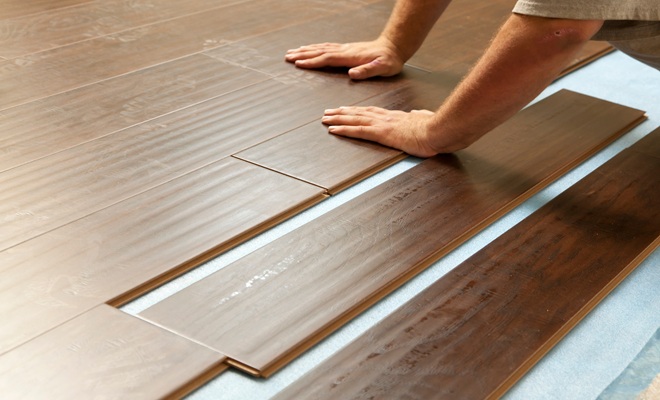
Pros
- ✔ No sanding or finishing required
- ✔ Can be sanded and refinished at least once (more if there is sufficient thickness)
- ✔ Cheaper than solid wood
Cons:
- ✖ Installation can be difficult
- ✖ It can’t be resanded as much as solid wood, so it has a shorter lifespan
- ✖ It isn’t suitable for bathrooms
Solid Hardwood Flooring Installation Cost
A solid hardwood floor is durable and easy to maintain. You can also buy reclaimed wood flooring if you’re looking for an environmentally friendly option. Another benefit is that you can sand down and re-varnish a wooden floor over the years to keep it looking like new.
Solid Hardwood Cost
The price you can pay for ranges from £50 to £90 per m2.
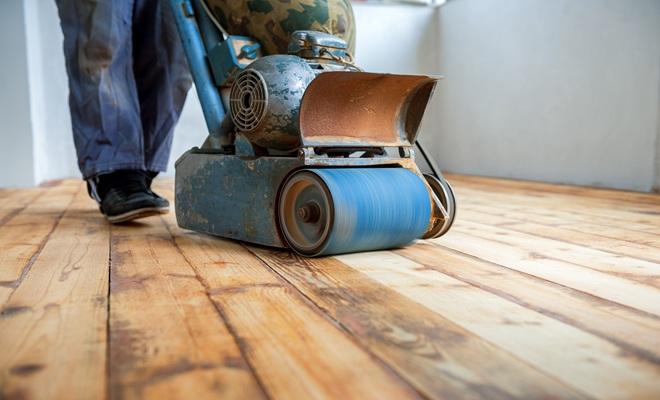
Pros
- ✔ Long-lasting
- ✔ Easy to maintain
- ✔ Can be sanded and re-varnished many times
Cons:
- ✖ More expensive than most other floor types
- ✖ Noisy underfoot
- ✖ Can scratch and dent
Vinyl Flooring Installation Cost
Vinyl flooring is one of the cheapest flooring options. It’s popular because it is available in a wide range of colours and designs, and it’s easy to lay.
Vinyl Flooring Cost
The cost of vinyl flooring, on average, is between £10 and £30 per m2.
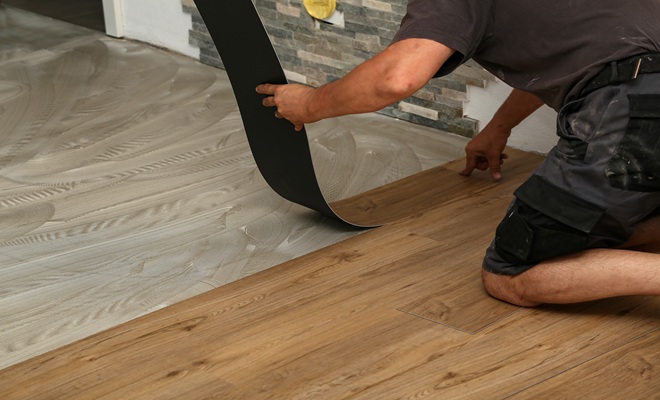
Pros:
- ✔ Affordable
- ✔ Durable
- ✔ Easy to install
Cons:
- ✖ Colours can fade over time
- ✖ Prone to developing dents from heavy furniture
- ✖ It doesn’t biodegrade, so it’s not recyclable
Carpet Installation Cost
Carpet will bring a warm look to your home, and it’s available in many colours and styles with prices to suit most budgets.
Carpet Flooring Cost
You can buy a Berber carpet for around £6 per m2 or splash out on woven carpet, which costs on average around £60 per m2.
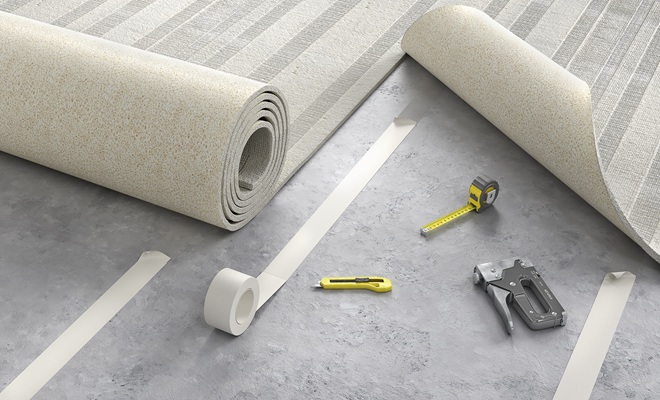
Pros
- ✔ Warm underfoot
- ✔ Reduces noise
- ✔ Some carpets can be recycled
Cons:
- ✖ Not the best choice if you have allergies
- ✖ Cleaning up spills is more difficult than with other flooring types
- ✖ Cheaper carpet may have a shorter lifespan than a wood or tiled floor
Tile Flooring Installation Cost
A tiled floor is easy to clean and it’s suitable for every room in the home, including the kitchen and bathroom. Tiles are also ideal if you have underfloor heating as they are efficient at transferring heat to the floor’s surface.
Tiled Flooring Cost
The cost of tiling depends on the material you use. Ceramic tiles are the most cost-effective and cost between £15 and £25 per m2. Marble tile, on the other hand, will cost more than double, at between £40 and £50 per m2.
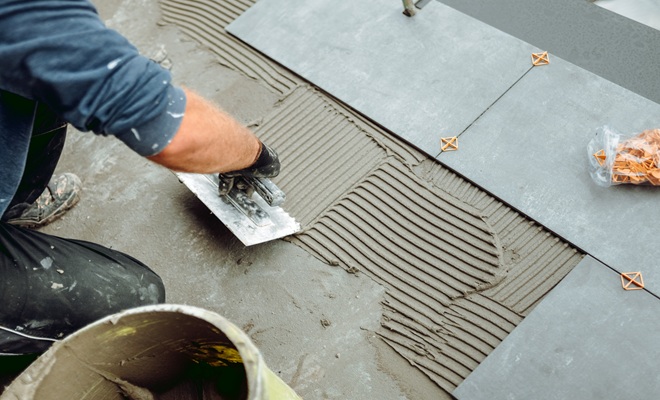
Pros:
- ✔ Easy to clean up spills
- ✔ Good conductivity with underfloor heating
- ✔ Can be used in areas where there is moisture, like kitchens and bathrooms
Cons:
- ✖ Tiles don’t absorb noise like carpet
- ✖ More expensive than some other flooring types
- ✖ Cold underfoot without heating
Luxury Vinyl Tiles (LVT) Flooring Installation Cost
Luxury Vinyl Tiles are made from a PVC core with layers of other materials and treated so that they are completely waterproof. They are designed to look like wood or tiles in a wide selection of colours and designs.
Luxury Vinyl Flooring Cost
The cost of Luxury Vinyl Tiling depends on the quality of the material. Prices start at between £15 and £25 per m2. High-quality LVT flooring, however, will cost between £40 and £60 per m2.
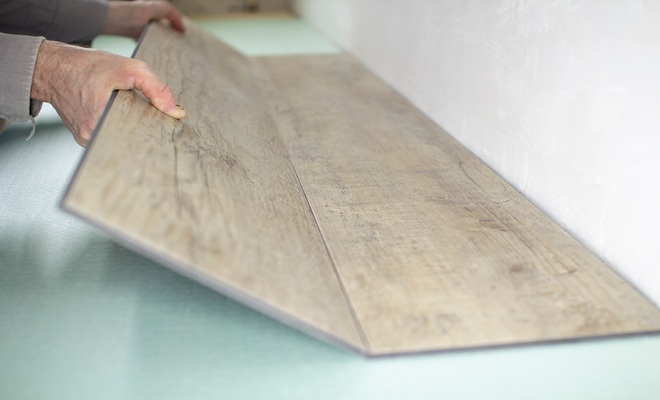
Pros
- ✔ Strong and durable
- ✔ Waterproof
- ✔ Cheaper than wood or tiles
Cons:
- ✖ Colours may fade over time in strong sunlight
- ✖ PVC material means it is not environmentally friendly
- ✖ Can be prone to scratching
DIY vs Professional Flooring Installation: When to Lay Flooring Yourself
If you want to install a new floor as a DIY project, then it is best to choose laminate, vinyl or carpet, which are often carried out by DIY enthusiasts. There are things to consider, though, before you decide to do the work yourself. Firstly, you need the time and the right equipment to get the job done.
Secondly, your measurements need to be accurate. If you don’t buy enough flooring, you’ll be left with gaps to fill, and if you buy too much material, you’ll have wasted your money. The final consideration is the quality of your workmanship. Are you experienced enough to do a good job?
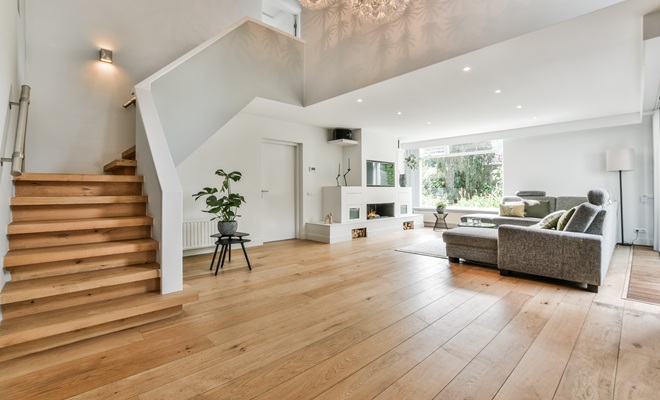
Hiring a professional takes the responsibility for the installation off your shoulders. If you can rely on a skilled worker who has plenty of flooring experience, you know you’ll have a good outcome. Plus, a professional should provide a guarantee. This means if any problems do arise, it’s up to the contractor to put them right.
Regulations and Compliance
Noise
If you are laying a new floor in a house, then building regulations don’t normally apply. But if you are laying new flooring in a flat and you are swapping carpet for hardwood, for example, you will have to comply with soundproofing regulations (Approved Document E) and you will be expected to provide adequate acoustic insulation.
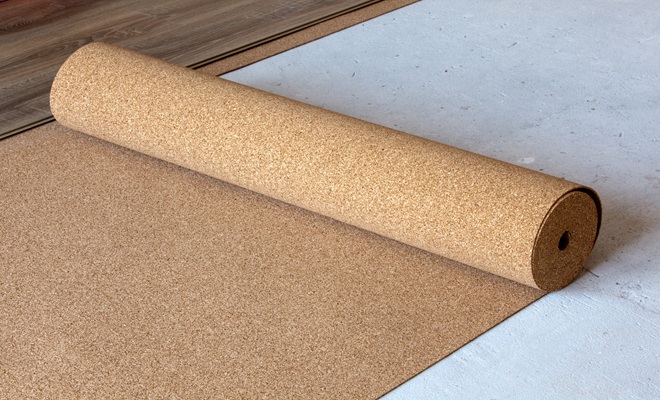
Householders in a listed building will have to obtain approval for internal changes, including new flooring, especially if you are covering an original feature.
Fire Safety
All flooring must meet minimum fire safety standards, which are set out in Approved Document B. In a residential building, the floor material should meet Class Bfl-s1 or Cfl-s1.
Slip Resistance
The recommendations in Approved Document K state that in areas where there is a risk of slipping, such as in bathrooms and kitchens, the flooring should minimise the risk of slipping.
The testing standard commonly used in the UK is the Pendulum Test Value (PTV). A rating of 36+ is considered a low-slip material. Between 25-35 is moderate, and between 0-24 is a high slip rating.
Cost of Removing and Replacing Flooring
The cost of removing and replacing flooring will, of course, depend on the type of flooring and the room size. For example, it will take longer to remove a tiled floor than it will a carpet. You should expect to pay between £15 and £20 per hour. Removing a carpet might take less than an hour, but removing an old wood floor could take between 4 and 6 hours.
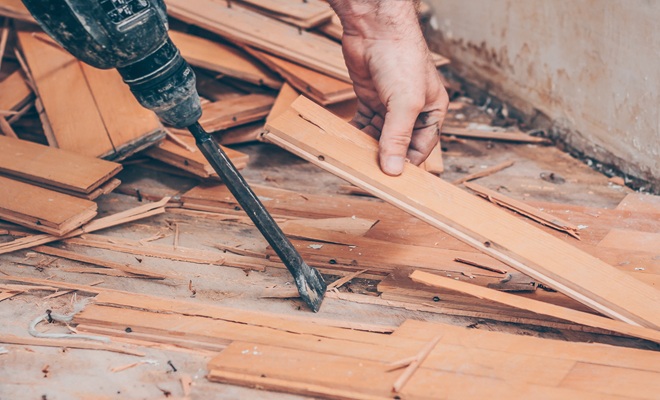
On top of the removal costs, you will also have to dispose of the old floor. Hiring a skip will cost in the region of £100 and £150. Hiring a person with a van might cost between £20 and £30 an hour.
FAQs
Finding and Hiring a Professional Flooring Installer
The easiest way to find a reliable professional is to get quotes from the PriceYourJob website.
All you need to do is select what type of tradesperson you need. For example, click on flooring specialist and you’ll then get a choice of flooring categories. Next, you describe the job, select your budget and give a rough timeline for when you want the job done.
Enter your postcode and give us your name, address and phone number. We’ll then source up to 3 local professionals to give you quotes.
Other ways you can find professionals are to put in the name of the trade +near me in your search engine and browse the websites of the professionals that come up in your search.
Friends, colleagues and family are also a good way to find a recommended contractor. A happy customer will always be glad to recommend a professional who has done a good job.
When you talk to a contractor, before you get a quote, ask them:
- Are they a member of a trade organisation? Flooring specialists might include:
- Do they have Public Liability Insurance and Employer’s Liability Insurance if they have staff?
- Do they have a website with testimonials or recommendations from customers they’ve worked for in the past?
- Do they arrange for rubbish disposal and removal?
Make sure, too, that each quote you get has a similar outline so you can easily compare the quotes.









